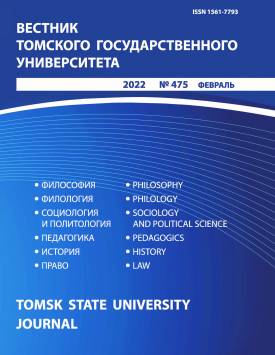Mindfulness-based differentiation in foreign language instruction: Teacher training aspects
In the modern world the quickly changing political and socioeconomic conditions lead to significant changes in the sphere of foreign language teaching. As a result, more attention is paid to innovative and efficient technologies, which address the needs and necessities of every learner. This article aims to substantiate the effectiveness of mindfulness-based differentiated learning technology in foreign language instruction. Nowadays differentiated learning is one of the leading educational technologies. This article regards differentiation as a technology, which has inclusive nature, i.e. it addresses every learner with no exception. The final aim of differentiation is the ability of every learner to follow their individual learning route. The effectiveness of an educational technology is directly connected with the ensuring of psychological security of the educational process. In the context of differentiated learning the threat to psychological security may lie in the choice of the wrong basic principle for differentiation. The authors of the article see the solution to the problem in organizing differentiation on the basis of mindfulness, namely with the consideration of learners' value-sense orientations. In the framework of this research value-sense orientation is a constituent part of the construct “mindfulness” along with attention, empathy, self-reflection, self-regulation, openness to novelty. The work on the basis of value-sense orientations in foreign language instruction can be effectively organized during reading comprehension classes. Text analysis helps learners initiate the processes of value-sense formation (first with the assistance of a teacher, later independently). Learners' language skills are developed in the process of meaning-making (deciphering the author's meanings and generating one's own meanings). The processes of value-sense dynamics promote the differentiation and individualization of the educational process. For differentiation in language learning to be successful a teacher should be the first to acquire this experience and reflect on it. The atticle describes the methodology of differentiated instruction on the basis of mindfulness (via stimulation of the learners' processes of value-sense dynamics) by the example of continuous professional development courses for foreign language teachers in Chernushka (Perm Krai). The effectiveness of the suggested methodology was assessed with the help of control and diagnostic tools, which included two questionnaires as well as formative assessment tools for foreign language learning. The results of control and diagnostic activities proved the effectiveness of mindfulnessbased differentiation since the conducted course promoted the development of communicative competence in foreign language teachers, enhanced their motivation for self-development and professional achievement.
Keywords
differentiation, foreign language instruction, mindfulness, value-sense orientation, meaning-making, reading for meaning, teacher trainingAuthors
| Name | Organization | |
| Bezukladnikov Konstantin Е. | Perm State Humanitarian Pedagogical University | konstantin.bezukladnikov@gmail.com |
| Popova Natalya S. | Perm State Humanitarian Pedagogical University; Perm State National Research University | natasharubina@yandex.ru |
| Zhigalev Boris A. | Linguistics University of Nizhny Novgorod | zhigalev@lunn.ru |
References

Mindfulness-based differentiation in foreign language instruction: Teacher training aspects | Vestnik Tomskogo gosudarstvennogo universiteta – Tomsk State University Journal. 2022. № 475. DOI: 10.17223/15617793/475/14
